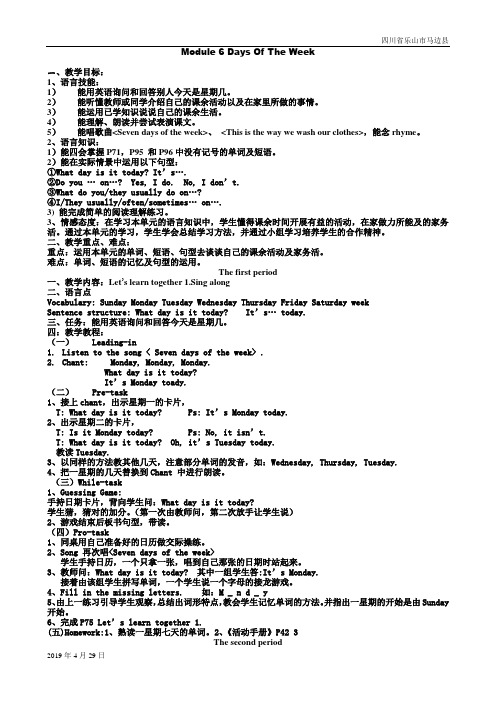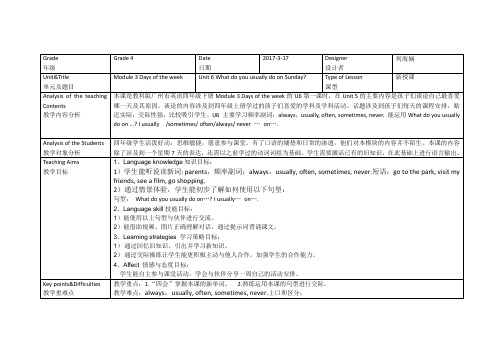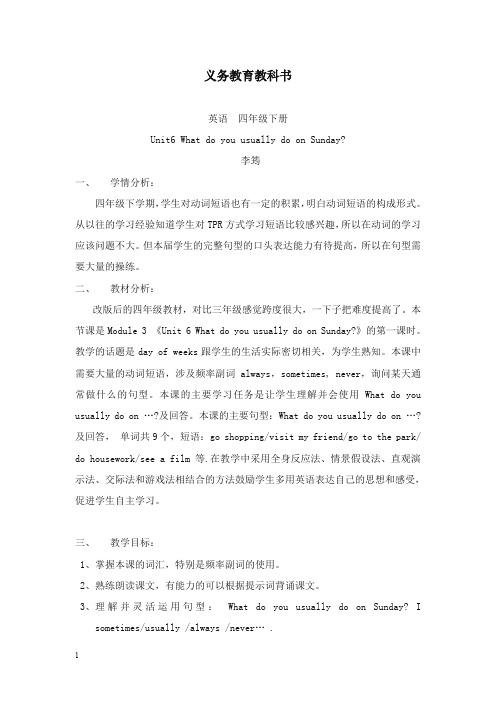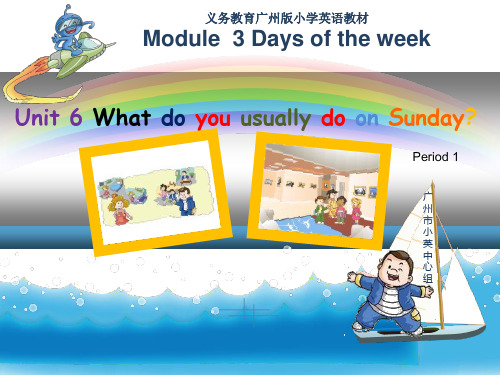广州版小学英语四年级下册:Unit 6 What do you usually do on Sunday
四年级下册英语课件Modue 3 Days of the week Unit 6 What do y

Let’s Talk
Aki: What do you usually do on Sunday ?
Ben: I usually take exercise on Sunday morning.
Aki: What do you always do on Sunday ?
总是
Janet: I always help my parents do housework on Sunday. Sometimes I clean my room and sometimes I clean the kitchen.
exercise
listen to music
I usually _________ on weekends.
go skateboarding
surf the Internet
I usually _________ after school.
play football
go shopping
He often _________ on weekends.
7:00
8:00-4:30
do my homework
Saturday evening never
Visit my friends
Sunday morning often
help parents do housework
Monday evening always
go to the park
Friday afternoon usually
Aki: What do you ......do on …? Ben: I …on…
get up
6:15
have breakfast have classes
广州版小学英语四年级下册《Module 3 Days of the weekUnit 6 What do you usually do on Sunday

Module 6 Days Of The Week一、教学目标:1、语言技能:1)能用英语询问和回答别人今天是星期几。
2)能听懂教师或同学介绍自己的课余活动以及在家里所做的事情。
3)能运用已学知识说说自己的课余生活。
4)能理解、朗读并尝试表演课文。
5)能唱歌曲<Seven days of the week>、<This is the way we wash our clothes>,能念rhyme。
2、语言知识:1)能四会掌握P71,P95 和P96中没有记号的单词及短语。
2)能在实际情景中运用以下句型:①What day is it today? It’s….②Do you … on…? Yes, I do. No, I don’t.③What do you/they usually do on…?④I/They usually/often/sometimes… on….3) 能完成简单的阅读理解练习。
3、情感态度:在学习本单元的语言知识中,学生懂得课余时间开展有益的活动,在家做力所能及的家务活。
通过本单元的学习,学生学会总结学习方法,并通过小组学习培养学生的合作精神。
二、教学重点、难点:重点:运用本单元的单词、短语、句型去谈谈自己的课余活动及家务活。
难点:单词、短语的记忆及句型的运用。
The first period一、教学内容:Let’s learn together 1.Sing along二、语言点Vocabulary: Sunday Monday Tuesday Wednesday Thursday Friday Saturday weekSentence structure: What day is it today? It’s… today.三、任务:能用英语询问和回答今天是星期几。
四:教学教程:(一)Leading-in1.Listen to the song < Seven days of the week> .2.Chant: Monday, Monday, Monday.What day is it today?It’s Monday toady.(二)Pre-task1、接上chant,出示星期一的卡片,T: What day is it today? Ps: It’s Monday today.2、出示星期二的卡片,T: Is it Monday today? Ps: No, it isn’t.T: What day is it today? Oh, it’s Tuesday today.教读Tuesday.3、以同样的方法教其他几天,注意部分单词的发音,如:Wednesday, Thursday, Tuesday.4、把一星期的几天替换到Chant 中进行朗读。
广州版四年级下u6whatdoyouusuallydoonSunday知识讲解

clean her room do his homework go shopping
Let’s Read
板书 读句子 读课文
• go running • go swimming • go shopping
see a film
visit my friends
go to the park
do homework
clean the room
go shopping
clean the kitchen
see a film
visit my friends
go to the park
do homework
clean the room
go shopping
clean the kitchen
I
Sunday do my homework usually
I usually do my homeswork
on Sunday.
.
Sunday
clean my room sometimes
I
Sunday clean my room sometimes
I sometimes clean my roosm.
广州版四年级下 u6whatdoyouusuallydoonSu
nday
• on后常接某日,星期几,某日或某周日的 朝夕,节日等。如:
• on Sunday (星期日)
• on the weekend • on Christmas afternoon (圣诞节下午) • on October 1,1949 (1949年10月1日) • on New Year’s Day (新年) • on the morning of the 15th (15日的早
【精选】广州版小学英语四年级下册Unit 6 What do you usually do on Sunday 知识点、重点解析

Unit 6 What do you usually do on Sunday ?词汇句型2.1 What do you usually/often do on Sunday ?I always / often ....你通常在周日做些什么?我通常....拓展:What do you usually do on Sunday ? I usually help my mother do housework. 你周日通常做什么?我通常帮助我的妈妈做家务。
2.2 Sometimes I clean my room .Sometimes I clean the kitchen.有时候我打扫我的房间。
有时候我打扫厨房拓展:Sometimes I see a film. Sometimes I go to the park.有时候我看电影。
有时候我去公园。
2.3 I never do housework on Sunday.我在周日从来不做家务。
拓展:I never visit my friends on Monday.我从来不在周一探望朋友。
2.4 Like what ?比如说?课文翻译-What do you usually do on Sunday?-I do my homework. And you?-I always help my parents do housework.-Like what?-Sometimes I clean my room. Sometimes I clean the kitchen.-I never do housework on Sunday. But I often go shopping with my mum and dad.-你星期日通常做什么?-我做家庭作业。
你呢?-我总是帮助我的父母做家务。
-比如什么?-有时我打扫房间。
有时我打扫厨房。
-我星期日从不做家务。
教科版-广州用(三起)四年级(下)《Unit6WhatdoyouusuallydoonSunday》

教科版-广州用(三起)四年级下册《Unit 6 What do you usually do on Sunday》2017 年同步练习卷(1)一、解答题(共1 小题,满分3 分)1.(3 分)补全对话所缺的单词Do you like sports,Rick?﹣﹣Yes,I do.﹣﹣What(1)do you like?﹣﹣Swimming,running,football(2)table tennis(乒乓球).My favourite is table tennis.﹣﹣Are you good(3)it?﹣﹣Of course.I'm the best in my school.﹣﹣Really?Who do you play with?﹣﹣(4)Monday to Friday,I play (5)my PE teacher at school.On Saturday and Sunday,I(6)with my father in a park near my home.﹣﹣What time(7)you play?At noon or after school?﹣﹣Usually after school,sometimes at noon.﹣﹣I see.二、回答问题2.(3 分)根据实际情况回答问题.What day is ittoday?.3.(3 分)根据实际情况回答问题.What time do you go to school?.4.(3 分)根据实际情况回答问题.Do you have a PE class on Tuesday?.5.(3 分)根据实际情况回答问题.What do you usually do on Sunday?.6.(3 分)根据实际情况回答问题.Do you often help your parents do housework?.三、连词成句7.(3 分)Monday do on what school do after you usually (?).8.(3 分)my I on Saturday friends visit sometimes afternoon (.).9.(3 分)on housework always do I morning Saturday (.).10.(3 分)never Friday we cook Monday from lunch to (.).11.(3 分)Saturday nine o'clock and on Sunday I usually get up at morning (.).12.(3 分)ten at he park visits the dad often with the his.四、阅读13.Hi,I am Cindy.I'm ten years old.My favourite day is Sunday.I usually visit mygroundparents with dad and mom.Their house is not far.We go there by bus.From 9:00 to 11 00 I help my grandparents clean the house.We always have lunch at 12:00.We often go to the park in the afternoon.Sometimes we see a film together after dinner.How happy we are!1.Cindy is years old.A.11B.10C.92.Cindy and her family always at 12:00.A.clean the houseB.go to the parkC.have lunch3.they see a film after dinner.A.SometimesB.UsuallyC.Always4.Cindy cleans the house from 9:00 to 11:00 on .A.Saturday morningB.Sunday morningC.Sunday afternoon5.How many people are there in grandparents'house on Sunday morning?A.Five B.Two C.Three.教科版-广州用(三起)四年级下册《Unit 6 What do you usually do on Sunday》2017 年同步练习卷(1)参考答案一、解答题(共1 小题,满分3 分)1.sports;and;at;From;with;play;do;二、回答问题2.;三、连词成句7.What do you usually do after school on Monday?;8.I sometimes visit my friends onSaturday afternoon;9.I alwaysdohousework onSaturday.;10.We never cook lunch from Monday to Friday;11.I usually get up at nine o'clock on Saturday and Sunday morning;12.He often visits the park with his dad at ten;四、阅读13.B;C;A;B;A;“”“”At the end, Xiao Bian gives you a passage. Minand once said, "people who learn to learn are very happy people.". In every wonderful life, learning is an eternal theme. As a professional clerical and teaching position, I understand the importance of continuous learning, "life is diligent, nothing can be gained", only continuous learning can achieve better self. Only by constantly learning and mastering the latest relevant knowledge, can employees from all walks of life keep up with the pace of enterprise development and innovate to meet the needs of the market. This document is also edited by my studio professionals, there may be errors in the document, if there are errors, please correct, thank you!。
小学英语四年级下册Unit6WhatdoyouusuallydoonSunday 教学设计

小学英语四年级下册Unit 6 What do you usually do on Sunday?教学反思本课时是Unit 6的第二课时,第一课时我们学习了Unit6的新单词、简单地区分频率副词以及学习了句型T usually/always/sometimes/often/never... on....本课时学习目标是学生能说和用What do you usually do on Sunday? I usually... on....以及理解课文流畅地熟读课文。
本节课以一起作业为情景,学生每次完成学习任务都能获得‘学豆'。
整节课以一首Days of the week 开始,活跃课堂气氛并且复习了一周七天。
歌曲后引出几个复习句子。
第二环节是ball games,这个环节设计意图是复习这学期学过的短语还有第一课时学过的频率副词。
第三个环节是学习新句型,因为在第一课时的时候已经学过I usually/always/sometimes/often/never... on....大大降低了学生学习的难度。
在这个环节老师设计了一个Stand up-hand up-pair up 学习策略来操练句型。
教师把上学期和本学期出现过的短语都融入卡片里面让学生训练。
比起传统的操练这个学习策略比较机动灵活,而且容量大、学生可以随意搭配组合所以学生比较喜欢,操练结果节本上达到老师预期效果。
第四个环节是学习课文,因为在学习课文过程中进行了三次听课文,学生能流畅地朗读课文。
最后一个环节是调查问卷。
这个环节只设计了两个调查问题好像比学生能力低很多,看起来不是非常符合拓展运用的要求。
这节课存在很多不足的地方:1、课堂容量不大。
2、环节之间过度不自然。
3、个别环节时间分配不恰当。
4、第五个环节设计的内容还需要调整难度。
恳请领导们和老师们给出宝贵的意见和建议。
5、在各个活动之间的过渡语还可以更加巧妙,一节精彩的课离不开精心设计的过渡语,它们会让课堂更流畅和锦上添花。
小学英语三年级起点四年级下册 Unit 6 What do you usua

Activity 3:
通过介绍新朋友Peter复习旧知,并导入新知、图片学习新短语see a film
Activity 4:
通过转盘游戏复习动词短语并引出新短语go to the park, visit my friends, see a film, go shopping,并利用图片,通过听力连线教授新短语。
Activity 8:
看课表就自己的兴趣爱好向同伴表达自己喜爱的学科。I lovedoingsth,SoIlove…lessons.
Activity 9:
观看视频并回答问题,尝试用两个回合的对话进行交流。
Activity 10:
What’s your favourite day?
My favourite day is _____.
Activity 1:
齐唱歌曲:week
Activity 2:
师生交谈
Activity 1:
热身,通过歌曲调节课堂气氛,引出话题。
Activity 2:
师生交谈,导入课题。
(二)Presentation&Practice
Activity 3:
通过认识新朋友Peter,学习新词。
Activity 4:
通过转盘游戏学习并上口新短语。
Activity 3:
在创设的情景,介绍Peter重现复习Module1描述人物的句式,并自然过渡学习新词。
Activity 4:
利用游戏,自然过度学习新单词。
Activity 5:
Let’splay转盘游戏操练新词组
1)通过回忆旧知识,引出并学习新知识。
2)通过交际操练让学生能更积极主动与他人合作,加强学生的合作能力。
四年级下册英语教案-Module 3 Days of the week Unit 6 What do

四年级下册英语教案-Module 3 Days of the week Unit 6 What do you usually do on Sunday 课时2 教科版(广州,三起)教学目标1.学生能够使用英语表达关于周日日常活动的问句和回答。
2.学生能够加强对英语时间的理解和灵活运用。
3.学生能够通过和他人交流,增强口语表达能力和自信心。
教学重点1.学习使用英语表达周日日常活动的问句和回答。
2.加强对时间的理解和应用。
教学难点1.学生在短时间内对英语时间的理解和应用。
2.学生在口语表达时要自然流畅。
教学方法交互式教学法,情境教学法,游戏教学法。
预习准备预习本课时所需的词汇,并思考下列问题:1.What do you usually do on Sunday?2.Do you like to do these things on Sunday? Why? / Why not?教学过程Step 1: 导入新课1.向学生出示图片,并问学生:“What day is it today?”, “What day is tomorrow?”, “What day is after tomorrow?”等问题,让学生回答。
2.学生与教师一起模仿英语发音。
Step 2: 预习巩固1.要求学生将本单元单词表背诵熟练。
2.以小组为单位,让学生互相出题考察对方对单词的掌握情况。
Step 3: 教学重点1.学习英语日常活动表达,如:watch TV, read books, play football等。
2.教师为学生出示图片,并向学生询问每个人周日通常会做什么活动,例如:’What do you usually do on Sunday?’3.学生理解问题后用英语回答,例如:’I usually watch TV on Sunday.’4.学生之间互相提问并回答。
Step 4: 巩固练习1.教师为学生出示图片,让学生根据图片情境用英语进行简单对话。
广州版英语四年级下册module 3 unit 6《what do you usually do on sunday》教案1.doc

义务教育教科书英语四年级下册Unit6 What do you usually do on Sunday?李筠一、学情分析:四年级下学期,学生对动词短语也有一定的积累,明白动词短语的构成形式。
从以往的学习经验知道学生对TPR方式学习短语比较感兴趣,所以在动词的学习应该问题不大。
但本届学生的完整句型的口头表达能力有待提高,所以在句型需要大量的操练。
二、教材分析:改版后的四年级教材,对比三年级感觉跨度很大,一下子把难度提高了。
本节课是Module 3 《Unit 6 What do you usually do on Sunday?》的第一课时。
教学的话题是day of weeks跟学生的生活实际密切相关,为学生熟知。
本课中需要大量的动词短语,涉及频率副词always,sometimes, never,询问某天通常做什么的句型。
本课的主要学习任务是让学生理解并会使用What do you usually do on …?及回答。
本课的主要句型:What do you usually do on …?及回答,单词共9个,短语:go shopping/visit my friend/go to the park/ do housework/see a film 等.在教学中采用全身反应法、情景假设法、直观演示法、交际法和游戏法相结合的方法鼓励学生多用英语表达自己的思想和感受,促进学生自主学习。
三、教学目标:1、掌握本课的词汇,特别是频率副词的使用。
2、熟练朗读课文,有能力的可以根据提示词背诵课文。
3、理解并灵活运用句型:What do you usually do on Sunday? Isometimes/usually /always /never… .四、教学重点:1、What do you do usually do on Sunday?及其回答。
2、频率副词 always/ often /never的理解。
广州版四年级下u6 what do you usually do on sunday

always
Sunday Monday Tuesday Wednesday Thursday Friday Saturday
usually
often
sometimes
never
√ √ √ √ √ √ √ √ √ √ √ √ √ √ √ √ √ √
√ √ √
Let’s Listen
clean my room sometimes
I
Sunday clean my room
sometimes
I on
sometimes clean my room. s
Sunday.
.
clean the kitchen
sometimes
I
Sunday clean the kitchen
sometimes
clean the room
p f
a r m k
★
a l M pl d a y s w
★
n oer kv e w
r
★
p f
a r m k
visit my friends see a film
go to the park
do homework go shopping
clean the room clean the kitchen
…
do my homework
…
…
…
Do you always … go to … the park on Sunday?
always
Activities
go to the park do my homework do housework go shopping clean my room
四年级下册英语教案-Module 3 Unit 6《What do you usually do o

四年级下册英语教案-Module 3 Unit 6《What do you usually do on Sunday》|教科版(广州深圳)教学目标1.学生能够准确理解并能够正确使用词汇:“usually, always, sometimes, never”。
2.学生能够通过听力、口语训练,掌握关于日常活动的表达方式。
3.学生能够通过读写训练,掌握日常活动的问句和肯定/否定回答方式。
教学重点1.学习四个常用的频率副词。
2.学习问句和肯定/否定回答的表达方式。
教学难点1.同学通过练习和实践,能够准确使用四个频率副词,并理解频率副词在英语中的深层次意义。
2.同学能够正确区分肯定与否定回答,并准确作答所给问题。
教学流程Step 1 自我介绍 (5 minutes)老师向同学们介绍自己,并邀请同学们轮流自我介绍,以加深同学们之间的相互了解。
Step 2 词汇学习 (10 minutes)老师通过投影仪将 usually, always, sometimes, never 四个词汇呈现在课堂上,并且课堂上模仿场景,让同学们手舞足蹈地模仿四个频率副词,以此学习和记忆这些词汇。
Step 3 听力练习 (15 minutes)1.老师分发练习材料,上面有五个问题和五个答案。
2.老师播放录音,同学们仅听一次并进行回答。
3.老师放录音第二遍,走过每一个同学,让他们回答自己的听力题。
Step 4 问答练习 (20 minutes)1.老师根据学生的听力反应情况,重新设计日常活动的问答方式并展示出来。
2.给同学们分时间,让其在课堂中进行问答练习。
Step 5 读写练习 (20 minutes)1.老师上传练习材料,让同学们根据所学的四个频率副词完成一份练习呈现出来。
2.完成练习后,老师选取几份练习进行批改,并进行评分。
Step 6 巩固练习 (10 minutes)最后,老师给同学们分发回答卡,让他们独立进行回答,检查他们掌握的情况,同时,检查在课堂上所学习到的内容并进行总结。
广州版英语四下M 3 Unit 6《What do you usually do on Sunday

Ilove____________, Ilovesciencelessons.
Ilovedrawingpictures, Ilove_________.
I'mgoodatEnglish, Ilove___________.
J:Whatdoyouusuallydoon____________? M:Idomy______________. Andyou? J:Ialways_______my________do_______. M:Like_______? J:SometimesI________my__________. SometimesI________the_________. M:I_____do_______onSunday. ButIoftengo________withmymumanddad.
Let’slearn
some
times
sometimes
Sun
Mon
Tue
Wed
Thur
Fri
Sat
1
2
3
4
5
6
7
8
9
10
11
12
13
14
15
16
17
18
19
20
21
22
23
24
25
26
27
28
29
30
31
Ineverplaysports.
Let’slearn
driver
ne
usuallyneveralwaysoftensometimes
T
【名师原创-精优说课稿】广州教科版 (第6周)四年级下册英语同步备课 Unit 6 What do

【名师原创-精优说课稿】广州教科版 (第6周)四年级下册英语同步备课 Unit 6 What do you usually do on Sunday一、教学目标1.学习谈论周日的活动并使用一般现在时2.掌握一般现在时第三人称单数形式3.练习口语表达,并通过活动获取实际语言运用能力二、教学重点1.学习谈论周日的活动以及一般现在时的第三人称单数形式2.练习语言表达的应用能力三、教学难点如何使用一般现在时的第三人称单数形式描述周日的活动四、教学准备1.课件2.海报、图片等教具3.学生练习册五、教学过程1. 导入教师先出示几张图片,询问学生:“What do you usually do on Sunday?” 并引导学生回答。
2. 学习单词教师播放单词发音,学生跟读。
1.watch TV2.play soccer3.read books4.go swimming5.listen to music3. 学习句子及文化背景1.What do you usually do on Sunday?(你在周日通常做什么?)2.I usually… (通常我…)3.英国人星期天通常下馆子吃烤肉和喝啤酒。
4. 学习语法一般现在时的第三人称单数形式:单词+ s。
5. 练习教师提供几个句子,让学生根据图片判断正确的答案。
1.She watches TV on Sunday. (图片为人在电视前)2.He plays soccer on Sunday. (图片为人在踢足球)3.They read books on Sunday. (图片为人在看书)4.She goes swimming on Sunday. (图片为人在游泳池)5.He listens to music on Sunday. (图片为人在听音乐)6. 活动教师让全班分成小组,组内互相询问并记录周日的活动,最后向全班汇总报告。
六、课堂小结本节课主要学习了谈论周日的活动并使用一般现在时的第三人称单数形式。
完整版新广州版小学英语四年级下册课文参考

(完整版)新广州版学校英语四班级下册课文新广州版学校英语四班级下册课文Unit 1He looks like a cook① Who’s that woman?② Which women?③ The one with glass. She has a big beside her.④ She’s Miss Liu, our teacher .⑤ And that man in a white hat? Can you see him?⑥ Yes. But I don’t know him. He looks like a cook. Unit 2She is very kind① The new English teacher is in the teachers’room.② Really? What is she like?③ She has green eyes and a small mouth.④ And she is very young and shy.⑤ She is very kind.Unit 3 It’s time to get up① Mum, what time is it ?② It’s 7 o’clock. It’s time to get up.③ It’s half past seven now , time to go to school.④ It’s a quarter to ten. It’s time to sleep.⑤ Great. I am so tired.Unit 4When do you have class?① What time do you usually have breakfast?②Well, on school days I usually have breakfast at 7 o’clock in the morning.③ I see. And when do you have class?④I have classes from 8 o’clock in the morning to 4:30 in the afternoon.⑤ Hmmm. Do you take exercise?⑥Oh yes. I usually go running or swimming in the af ternoon from 4:30 to 5:30.⑦ Thank you very much.Unit 5What day is it today?① What day is it today? Is it Wednesday or Thursday?② It’s Wednesday.It’s my favourite day!③ Why do you like Wednesday?④ On Wednesday we have two PE lessons. I love sport.⑤I don’t like sport, so I don’t like Wednesday . My favourite day Is Thursday.Unit 6What do you usually do on Sunday?① What do you usually do on Sunday?② I do my homework. And you?③ I always help my parents do housework.④ Like what?⑤ Sometimes I chean my room. Sometimes I clean the kitchen .⑥I never do housework on Sunday. But I often go shopping with my mum and dad.Unit 7What do you when you have free time ?① It’s Sunday and I feel bored.② Me too. What do you do when you have free time?③ I often do some reading. Look, I’m reading an intersting book.④ I don’t like that. I usually watch cartoons. Shall we watcha cartoon?⑤ Great! Let’s watch the Monkey King.Unit 8What are you doing?① What are you doing? Ben.② I’m taking photos.③ May I have a lo ok at your photos?④ OK. This one is mum. She is running in the garden.⑤Oh. Look at this one. Grandma is reading in the her bedroom. Grandpa is watching TV.⑥ And I have one of you. You are eating in the kitchen!Unit 9It looks fun① What are the children doing in the playground, Ms White?②Some of the children are playing basketball and football, some of them are doing kung fu.③ What are the children doing next to the swimming pool?④ I think they are skating.⑤ It looks fun. I want to go and try it with them.Unit 10 I am very fast① What’s your favourite sport?② I am tall and I have long arms, so I like playing vollyball.③ My favourite sport is running. I am very fast.④ And what do you like doing, Jiamin?⑤ I like the water.⑥ So do you like swimming best?⑦ No, I like taking a bath.Unit 11I was born in January① Look at all the presents, cards and flowers! What’s going on?② We’re having a party for Jiamin’s birthday.③ Great!④ Happy birthday, Jiamin! I was born in January, too. How old are you?⑤I’m ten.⑥ Let’s pit 10 candles on the birthday cake.Unit 12Christmas is coming① It’s December already. Christmas is coming soon.② What do you like doing for Christmas, Ben?③In my home we like having a big family dinner with lots of great food.④ My d ad likes dressing up as Father Christmas. What about you, Jimin?⑤ I like making Christmas cards for my friends. Here’s one for you.⑥ Thanks, Jiamin.Vocabulary(单词):Unit 1 He looks like a cooklike 像look like 看起来像...which 哪一(个);哪一些with 有;和...在一起glasses 眼镜her 她(宾格)Miss 老师;姑娘know 懂him 他(宾格)policewoman 女警察policewomen 女警察(复数)uniform 制服Unit 2 She is very kindkind 和气的;慈祥的What is...like?...像啥shy 大方的round 圆的friendly 友好的Unit 3 It’s time to get updaily 日常的;每日routine 固定的程序;常规time 时刻It’s time to/for...是...的时候了up 向上get up 起床o’clock ...点钟half 一半的past 过去的;过去half past.. ....点半quarter 一刻,十五分钟to 差...到.....(点钟)a quarter to... ....点四十五分(差一刻钟到...点)sleep 睡觉tired 疲乏的lunch 午餐back 回home 家dinner 晚餐Unit 4 When do you have class?usually 通常well 好day 天,日breakfast 早餐at 在from 从from...to.... 从...到.. exercise 练习take exercise 体育熬炼run 跑步go running 去跑步swim 游泳Unit 5 What day is it today?week 周末today 今日Wednesday 星期三Thursday 星期四why 为啥Sunday 星期天Monday 星期一Tuesday 星期二Friday 星期五Saturday 星期六Unit 6 What do you usually do on Sunday?always 总是parent 父(母)亲housework 家务never 从来别often 经常go shopping 去购物park 公园visit 参观film 电影Unit 7 What do you when you have free time ? free 空暇的;自由的feel 感受bored 郁闷的Me too. 我也是do some reading 读点书interesting 有味的cartoon 漫画shall 将要Shall we...? 我们...好吗?king 国王Monkey King猴王take photos 拍照listen to... 听....email 发电子邮件;电子邮件picnic 野餐Unit 8 What are you doing?have a look 看一下fish 钓鱼fly 放(风筝);飞dance 跳舞Unit 9 It looks funfun 有味baskeball 篮球football 脚球kung fu 功夫;武术think 想skate 溜冰try 试;尝试table tennis 兵乓球jump 跳the long jump 跳远hight 高的;高地the high jump 跳高tennis 网球chess (国际)象棋Unit 10 I am very fastarm 手臂velleyball 排球fast 快的;飞速地water 水bath 洗澡take a bath 洗澡clever 聪慧的badminton 羽毛球Unit 11 I was born in January celebration 庆祝January 一月present 礼物card 卡;卡片go on 进行party 聚会was 是(is,am的过去式)candle 蜡烛be born... 生于cake 蛋糕February 二月March 三月April 四月August 八月June 六月November 十一月Unit 12 Christmas is coming Christmas 圣诞节December 十二月already 差不多soon 没多久lot 很多lots of 很多的;大量的dress 穿着as 如;像Father Christmas 圣诞老人July 七月summer 夏天holiday 假日May 五月Mother’s Day 母亲节September 九月Teachers’Day 老师节October 十月Halloween 万圣节spring 春天Spring Festival 春节。
4下_Module3_Unit6_What_do_you_usually_do_on_Sunday

7清洁房间clean ______________ 8打扫厨房 ___________ my room clean the kitchen
go shopping 9去购物_________________________
Sunday morning clean my room often
do housework
广 州 市 小 英 中 心 组
Let’s learn
I'm Xiaoling. I always go to the park on Saturday morning.
c par k
广 州 市 小 英 中 心 组
Sunday evening go shopping never
广 州 市 小 英 中 心 组
shop--op--sh—shop--shopping go shopping, go running, go swimming
mum + dad = parents
I‘m Janet. I always help my parents do housework. I often clean my room on Sunday morning.
Let’s learn
I'm Ben. I sometimes visit my friends on Saturday afternoon.
v i si t
广 州 市 小 英 中 心 组
Let’s learn
I'm Mike. I usually see a film on Saturday evening.
四年级下 Unit 6 What do you usually do on Sunday

Let's talk
I usually see a film on Saturday
evening.
知识讲解
1 What do you usually do on Sunday? 你通常在usually do on+某一天?”用于询问
你通常在星期天做什么?
课后作业
1.抄写新单词一遍 2.熟读课文 3.完成U6基础知识训练。
本课需要掌握的短语: go shopping do housework go to the park see a film do my homework clean my room visit my friends
本课需要掌握的句型: 询问对方在某一天做什么: What do you usually do on Sunday?
我帮妈妈打扫房间。
单项选择。
随堂练习
1.The girl always helps her mother ______ the room.
A. cleaning
B. cleans
C. clean
2. I don't like oranges, so I ______ eat oranges.
A. never
Today is Sunday.
例句:It's really a good film.
他们是我的父母。
I always help my parents do housework.
Sometimes I clean my room.
Let's see what they are doing.
What do you usually do on Sunday?
四年级下册英语教学设计-Module 3 Unit 6《What do you usually do

四年级下册英语教学设计-Module 3 Unit 6《What do you usually do on Sunday》|教科版(广州深圳)教学目标•学生能够听、说、读、写本单元中的短语和句子。
•学生能够谈论自己和家人在周末通常做的事情。
•学生能够表达周末活动的喜好和不喜好。
•学生掌握以下单词:rest, relax, run, jump, swim, skate。
•学生能够理解并运用现在进行时态。
教学内容及时间安排时间教学内容5 min复习上节课内容15 min听、说、读、写本单元中的短语和句子10 min谈论自己和家人在周末通常做的事情10 min表达周末活动的喜好和不喜好20 min掌握以下单词:rest, relax, run, jump, swim, skate30 min理解并运用现在进行时态10 min总结本节课内容5 min布置家庭作业教学过程Step 1. 复习上节课内容复习上节课中所学的短语和句子,并让学生用英语描述上周末的活动。
Step 2. 听、说、读、写本单元中的短语和句子•教师播放单元录音,让学生跟读单词和句子。
•以问答形式练习句子。
•写出句子并检查拼写。
Step 3. 谈论自己和家人在周末通常做的事情•教师示范谈论自己和家人在周末的活动,例如“I usually watch TV and play basketball on Sundays. My family usually goes shopping and has dinner together.”•让学生分组讨论并展示。
Step 4. 表达周末活动的喜好和不喜好•教师示范表达周末活动的喜好和不喜好,例如“I l ike watching movieson Sundays. I don’t like playing computer games on Sundays.”•让学生自己编造句子,并展示给全班分析。
- 1、下载文档前请自行甄别文档内容的完整性,平台不提供额外的编辑、内容补充、找答案等附加服务。
- 2、"仅部分预览"的文档,不可在线预览部分如存在完整性等问题,可反馈申请退款(可完整预览的文档不适用该条件!)。
- 3、如文档侵犯您的权益,请联系客服反馈,我们会尽快为您处理(人工客服工作时间:9:00-18:30)。
Unit 6 What do you usually do on Sunday?Focus PointsLet’s TalkWhat do you usually do from Monday to Friday? What do you usually do on Sunday? I always ...I sometimes ... Using these sentences to talk with your partner.Warming Up一.听写二.单词及短语1.总是_____________________2. 父母______________________3.家务_____________________4.从来不_____________________5.经常_____________________6.去购物_____________________7.公园_____________________ 8. 参观______________________9. 电影_____________________10. 和......一起玩_____________ 11. 帮助......做......____________三.课文内容根据提示把句子补充完整。
1. ________ do you ________ do ________ Sunday?2. I do my ________. And you?3. I ________ ________ my parents ________ housework.4. ________ I clean my room. Sometimes I clean the kitchen.5. I ________ do housework on Sunday. But I often go ________ ________ my mum and dad.My name is William. I’m a pupil and I love football. _______(星期六)is my favorite day. On Saturday I often play football with my _____. _____ 9:00______12:00, I play football ____ ____ _____(在公园). I ______(经常)play with Sam, Ken, Mike and Billy. Sometimes, I play in the playground. I _____ _____ _____play with Sandy because he often shouts his own goal. Language Points【知识考点一】What do you usually do on Sunday? 你通常在星期天做什么?usually表示“通常”on 是介词,表示“在......时候”,与星期和表示具体某一天的名词连用。
问句:What do you usually do on+ 某一天?此问句用于询问对方在某一天通常做什么,是what 引导的特殊疑问句。
答句:I / We +动词原形+其他.e.g. ---What do you usually do on Saturday? 你通常在星期六做什么?--- I watch TV with my family. 我和家人一起看电视节目。
拓展:第三人称单数的询问与回答。
问句:What does+ 主语(第三人称单数)+ usually do on +某一天?答句:He/ She +动词(短语)三单形式+其他.e.g. ---What does your father usually do on Sunday? 你的爸爸通常在星期天做什么?--- He reads books at home.【试试看】根据中文补全句子。
1. 你通常在星期三做什么?________ do you ________ do ________ ________?2. 他通常在星期四做什么?________ ________ he ________ do ________ ________?3. 他通常和朋友们一起玩。
He ________ ________ ________ his friends.【知识考点二】I always help my parents do housework. 我总是帮助我父母做家务。
always 意为“总是”;help ... do ...意为“帮助某人做某事”,do 要用动词原形。
例如:help me do some cooking 帮我做饭;help my mother clean the house 帮我妈妈打扫房间【试试看】根据中文补全句子。
1. 我有时帮助我爸爸浇花。
I ________ ________ my father ________ the flowers.2. 她经常帮助我学习英语。
She often ________ me ________ English.【知识考点三】I never do housework on Sunday. But I often go shopping with my mum and dad.我在星期天从来不做家务,但是我经常和爸爸妈妈去购物。
never表示“从来不”often表示“经常”with在这里表示“和......”e.g. I never eat spicy food, but my sister always enjoys it.我从来不吃辣的食物,但是我的妹妹总是很享受。
I often watch TV with my parents. 我经常和父母一起看电视。
【试试看】翻译句子。
1. 你经常和朋友一起看电影吗?________ you ________ ________ a movie ________ your friends?2. William 从来不去跑步吗?________ William ________ go ________?Fun with CultureGood BoyLittle Robert asked his mother for two cents. "What did you do with the money I gave you yesterday?""I gave it to a poor old woman," he answered."You're a good boy," said the mother proudly. "Here are two cents more. But why are you so interested in the old woman?""She is the one who sells the candy."Go For It一、选择不同类的单词,把其字母编号写在题前的括号内。
( ) 1. A. Wednesday B. week C. Monday( ) 2. A. why B. with C. what( ) 3. A. tired B. sleep C. watch( ) 4. A. film B. park C. visit( ) 5. A. always B. do C. often二、中英互译。
1. go to the park ________2. 探望我的朋友们________3. help me with housework________4. 看电影________5. go shopping ________6. 去游泳________7. after school ________8. 有时候________三、单项选择。
( ) 1. I always ________ in the sport center.A. have classesB. do houseworkC. swim( ) 2. My favourite day is ________.A. todayB. weekC. Sunday( ) 3. What ________ he usually ________ this weekend?A. is, doB. does, doC. does, doing( ) 4. We have classes ________ 8:30 ________ 12:00 in the morning.A. from, toB. at, atC. from, until( ) 5. Is it good ________ bad?A. andB. butC. or四、给句子选择合适的答语。
( ) 1. What day is it today?( ) 2. Why do you like Friday?( ) 3. What’s your favorite day ?( ) 4. Do you like music?( ) 5. What do you usually do on Sunday?五、按实际情况回答问题。
1.What do you usually do on Sunday?__________________________________________________________________________2.Do you help your mother with the housework?__________________________________________________________________________3. When do you do your homework?__________________________________________________________________________六、阅读理解。
Fred likes fish very much. One day, he buys(买) some fish and takes it home. His son sees the fish and says to himself, “Very good! I can ask my friends to have it for lunch.”The next day (第二天), Fred comes home in the evening. The fish isn’t there. His son says, “Oh, dad, your cat eats the fish.”Fred gets angry (生气). He takes the cat and his son to the shop andweighs (称) the cat. Then he says, “Little boy, my fish weighs one kilo, and the cat weighs one kilo too. My fish is here, then where is my cat?”根据短文内容选择正确答案。
